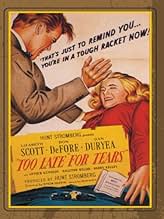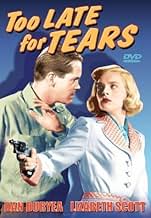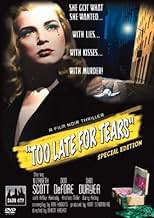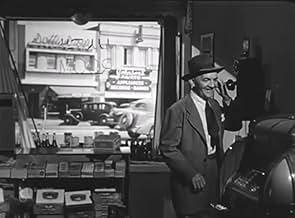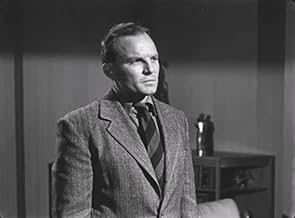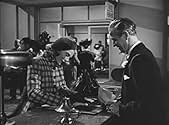PUNTUACIÓN EN IMDb
7,3/10
6,2 mil
TU PUNTUACIÓN
A través de una circunstancia casual, una mujer despiadada se tropieza con una maleta llena de 60.000 dólares, y está decidida a aferrarse a ella aunque signifique un asesinato.A través de una circunstancia casual, una mujer despiadada se tropieza con una maleta llena de 60.000 dólares, y está decidida a aferrarse a ella aunque signifique un asesinato.A través de una circunstancia casual, una mujer despiadada se tropieza con una maleta llena de 60.000 dólares, y está decidida a aferrarse a ella aunque signifique un asesinato.
- Premios
- 2 premios en total
Jimmy Ames
- Fat Man
- (sin acreditar)
Georgia Backus
- Woman
- (sin acreditar)
Robert Bice
- Policeman
- (sin acreditar)
Paul Bradley
- Hotel Clerk
- (sin acreditar)
John Butler
- Little Man Answering Phone
- (sin acreditar)
David Clarke
- Jack Sharber
- (sin acreditar)
Jimmie Dodd
- Second Car Thief
- (sin acreditar)
Renee Donatt
- Young Lover in Boat
- (sin acreditar)
Charles Flynn
- Policeman
- (sin acreditar)
Billy Halop
- Boat Attendant
- (sin acreditar)
Richard Irving
- First Car Thief
- (sin acreditar)
Perry Ivins
- Checkroom Attendant
- (sin acreditar)
Reseñas destacadas
Lizabeth Scott sinks her teeth into the role of a ruthless woman in "Too Late for Tears," also known as "Killer Bait," a 1949 film directed by Byron Haskin and written by a man who later became a very popular TV writer-director and creator of some top series, Roy Huggins.
The film also stars Dan Duryea, Don DeFore, and Arthur Kennedy.
Scott plays Jane Palmer, the wife of Alan Palmer (Kennedy) - while driving one night, someone from another car throws a satchel into their car. It turns out to be $60,000 (the equivalent of $598,000 today). Alan doesn't want anything to do with it, preferring to take it to the police, but Jane wants to keep it and spend it. Finally she convinces him to hide the money and wait for a time.
Jane, it turns out, is one tough cookie, and without giving much away, let's say that getting her hands on that money becomes her full time job, and she's determined that nothing and no one will stand in her way. Unfortunately for a few people, they stood in her way.
Really terrific noir set in Hollywood, with Dan Duryea playing a sleaze, but actually less of a sleaze than Jane - he's more of an opportunist than evil; Don Defore is friendly and unassuming as a friend of Alan Palmer's, and Arthur Kennedy, one of the finest actors in film, is just plain wasted. Perhaps this was a film he had to do in order to fulfill a contract, or it was a loanout on trade - it was a waste.
It's Scott's film, and with her husky voice, lovely smile and pouty lips, she's able to, at first anyway, hide a core of steel underneath.
Very good. If you're a fan of film noir, see this one.
The film also stars Dan Duryea, Don DeFore, and Arthur Kennedy.
Scott plays Jane Palmer, the wife of Alan Palmer (Kennedy) - while driving one night, someone from another car throws a satchel into their car. It turns out to be $60,000 (the equivalent of $598,000 today). Alan doesn't want anything to do with it, preferring to take it to the police, but Jane wants to keep it and spend it. Finally she convinces him to hide the money and wait for a time.
Jane, it turns out, is one tough cookie, and without giving much away, let's say that getting her hands on that money becomes her full time job, and she's determined that nothing and no one will stand in her way. Unfortunately for a few people, they stood in her way.
Really terrific noir set in Hollywood, with Dan Duryea playing a sleaze, but actually less of a sleaze than Jane - he's more of an opportunist than evil; Don Defore is friendly and unassuming as a friend of Alan Palmer's, and Arthur Kennedy, one of the finest actors in film, is just plain wasted. Perhaps this was a film he had to do in order to fulfill a contract, or it was a loanout on trade - it was a waste.
It's Scott's film, and with her husky voice, lovely smile and pouty lips, she's able to, at first anyway, hide a core of steel underneath.
Very good. If you're a fan of film noir, see this one.
This is a solid and sometimes memorable crime drama, filled with tension, and featuring some pretty good performances from the cast. The noir atmosphere works well, and the story, while perhaps far-fetched at a couple of points, is quite involved and grabs your attention from the beginning.
Lizabeth Scott gets one of her best roles, as a hard-hearted woman who seizes her opportunity to play the male characters against each other so that she can get what she wants. Scott is slightly lacking in the glamour that would make her a really memorable femme fatale, but she has plenty of strength, and her voice works well for the character. Dan Duryea gives one of his many fine noir performances, taking good advantage of his many opportunities with his shady character. Arthur Kennedy and Kristine Miller are both sympathetic as the more innocent of the main characters. Don DeFore's character sometimes seems a little out of place, but he is often crucial in advancing the plot.
The story starts with an unlikely coincidence, with a bag of money that gets tossed into the wrong car. But from there, most of the story developments follow naturally, and the tension is built up rather well as things get more complicated. It's an entertaining movie that has most of the things that fans of film-noir and crime drama would want to see.
Lizabeth Scott gets one of her best roles, as a hard-hearted woman who seizes her opportunity to play the male characters against each other so that she can get what she wants. Scott is slightly lacking in the glamour that would make her a really memorable femme fatale, but she has plenty of strength, and her voice works well for the character. Dan Duryea gives one of his many fine noir performances, taking good advantage of his many opportunities with his shady character. Arthur Kennedy and Kristine Miller are both sympathetic as the more innocent of the main characters. Don DeFore's character sometimes seems a little out of place, but he is often crucial in advancing the plot.
The story starts with an unlikely coincidence, with a bag of money that gets tossed into the wrong car. But from there, most of the story developments follow naturally, and the tension is built up rather well as things get more complicated. It's an entertaining movie that has most of the things that fans of film-noir and crime drama would want to see.
Byron Haskin of Arsenic and Old Lace and War of the Worlds fame teamed up with Roy Huggins to create this solid film noir entry. Huggins writing is superb for the genre - neither pretentious nor overly manic. The pace is brisk but not painfully so. And the film is very well conceived, well directed, well edited and very well acted.
The remarkable Lizabeth Scott (Jane Palmer), married to a young Arthur Kennedy (Alan Palmer), is the focus of our attention. The coupled are driving to a friend's house when a car flashes them and its occupant tosses a leather bag with 60,000 dollars into their car and drives off. Jane wants to keep it, Alan wants to turn it in. Soon, this windfall becomes a mixed blessing, as it reveals a rather frightening side of Jane's personality. The plot intertwines noir twists and turns and incessant mystery and, frequently, winds up in unanticipated places.
Lizabeth Scott is PERFECT, and really MAKES this film as much as the intriguing story and successful directing. Don Defore also turns in a notable performance as does Kristine Miller. Dan Duryea was nicely cast in his role as the heavy, but his performance here was just a sliver below his usual par.
This is very nice bit of noir cinema and will satisfy most noir fans, as well as modern crime drama aficionados. Recommended!
The remarkable Lizabeth Scott (Jane Palmer), married to a young Arthur Kennedy (Alan Palmer), is the focus of our attention. The coupled are driving to a friend's house when a car flashes them and its occupant tosses a leather bag with 60,000 dollars into their car and drives off. Jane wants to keep it, Alan wants to turn it in. Soon, this windfall becomes a mixed blessing, as it reveals a rather frightening side of Jane's personality. The plot intertwines noir twists and turns and incessant mystery and, frequently, winds up in unanticipated places.
Lizabeth Scott is PERFECT, and really MAKES this film as much as the intriguing story and successful directing. Don Defore also turns in a notable performance as does Kristine Miller. Dan Duryea was nicely cast in his role as the heavy, but his performance here was just a sliver below his usual par.
This is very nice bit of noir cinema and will satisfy most noir fans, as well as modern crime drama aficionados. Recommended!
In Los Angeles, Alan Palmer (Arthur Kennedy) and his wife Jane Palmer (Lizabeth Scott) are driving to a party when a suitcase is thrown in the back seat of their car. When they open the suitcase, they find a large amount but they are chased by another car and they flee. Alan decides to deliver the money to the police, but Jane opposes and wants to keep it. So Alan decides to keep the suitcase with the money in a locker at the Union Station to decide what to do. A couple of days later, Jane spends a large amount in furs and other gifts for her. Then a man called Danny Fuller (Dan Duryea) comes to their apartment and Jane believes he is a detective and let him in; but soon she learns that he is also seeking the money. When Alan returns from his work and finds the shopping, he becomes upset and Jane does not tell anything about Danny. During the night, Alan and Jane go to a boat ride to make amends and she accidentally kills him with his pistol. Danny is forced to help her to dump the body in a lake and Jane reports to the police that her husband is missing. Her sister-in-law Kathy Palmer (Kristine Miller) that lives in the same floor snoops around Jane's apartment and finds the receipt of the locker. When she is sneaking out, she meets the stranger Don Blake (Don DeFore) that tells that is Alan's friend. Meanwhile Jane is seeking the receipt to get the money for her. Why the money was thrown to the backseat of the Palmer's convertible? Who will keep the money? Who are Danny and Don Blake?
"Too Late for Tears" is a great film with all the elements of the film- noir: there is the sordid motive, the femme fatale and many twists. This movie is probably one of the best roles of the gorgeous Lizabeth Scott. The DVD release by "Dark City" has a poor video that needs restoration. But it is worthwhile watching since the story is excellent. My vote is eight.
Title (Brazil): Not Available on DVD or Blu-Ray
"Too Late for Tears" is a great film with all the elements of the film- noir: there is the sordid motive, the femme fatale and many twists. This movie is probably one of the best roles of the gorgeous Lizabeth Scott. The DVD release by "Dark City" has a poor video that needs restoration. But it is worthwhile watching since the story is excellent. My vote is eight.
Title (Brazil): Not Available on DVD or Blu-Ray
Made in 1949 this is one of those films that is a must for all noir fans. Do be warned though as this fell out of copyright some years ago and was widely duplicated – often very badly – but this is the restored version and is an absolute gem.
Late one night a couple are driving to a party that is far from inviting when a slow car tosses a bag into their open top car. The bag is choc full f cash. The wife is Jane Palmer (Lizabeth Scott) and she decides that she is going to hang onto the cash – despite what her husband wants. So she decides to convince him to keep it. He is cut from a different cloth and it soon becomes apparent how far she will go to keep it.
Now Lizabeth Scott is a show stealer here and that is even though everyone else is great too. She is so convincing as the manipulative and self centred vixen and I just loved it. As I said earlier watch out for poor copies or better still get the restored version. For those of you that love fashion, there are some timeless and elegant gowns on display here too and the men all wear zoot suits so you can't win 'em all. This is a must for all fans of the genre and one that has aged with style.
Late one night a couple are driving to a party that is far from inviting when a slow car tosses a bag into their open top car. The bag is choc full f cash. The wife is Jane Palmer (Lizabeth Scott) and she decides that she is going to hang onto the cash – despite what her husband wants. So she decides to convince him to keep it. He is cut from a different cloth and it soon becomes apparent how far she will go to keep it.
Now Lizabeth Scott is a show stealer here and that is even though everyone else is great too. She is so convincing as the manipulative and self centred vixen and I just loved it. As I said earlier watch out for poor copies or better still get the restored version. For those of you that love fashion, there are some timeless and elegant gowns on display here too and the men all wear zoot suits so you can't win 'em all. This is a must for all fans of the genre and one that has aged with style.
¿Sabías que...?
- CuriosidadesThe UCLA Film and Television Archive has remastered Demasiado tarde para lágrimas (1949) from a recently discovered original print. The restoration process took five years after the print was discovered in France, and involved piecing segments of another copy into the restored version to have a complete film. The restoration was funded by the Film Noir Foundation. The restored version was broadcast on 7/17/2015, on the Turner Classic Movies network in pristine condition. The restored version of the film was released in 2016 on Blu-ray in the United States and the United Kingdom. The film has developed a cult following in the years since its release.
- PifiasJane tells Alan that the $790 she has spent represents about one tenth of a percent of the money in the satchel. Since they thought they had $100,000 (later determined by Danny the blackmailer to be $60,000). One tenth of a percent of 100,000 would be $100, so she spent closer to eight tenths of a percent of what she thought they had. A tenth of a percent of $60,000 would be $60, and $790 would be slightly over 1.3 per cent of that amount.
- Citas
Danny Fuller: Don't ever change, Tiger. I don't think I'd like you with a heart.
- ConexionesEdited into Your Afternoon Movie: Too Late for Tears (2022)
Selecciones populares
Inicia sesión para calificar y añadir a tu lista para recibir recomendaciones personalizadas
- How long is Too Late for Tears?Con tecnología de Alexa
Detalles
- Fecha de lanzamiento
- País de origen
- Idiomas
- Títulos en diferentes países
- Too Late for Tears
- Localizaciones del rodaje
- Empresa productora
- Ver más compañías en los créditos en IMDbPro
- Duración1 hora 39 minutos
- Color
- Relación de aspecto
- 1.37 : 1
Contribuir a esta página
Sugerir un cambio o añadir el contenido que falta

Principal laguna de datos
By what name was Demasiado tarde para lágrimas (1949) officially released in India in English?
Responde

